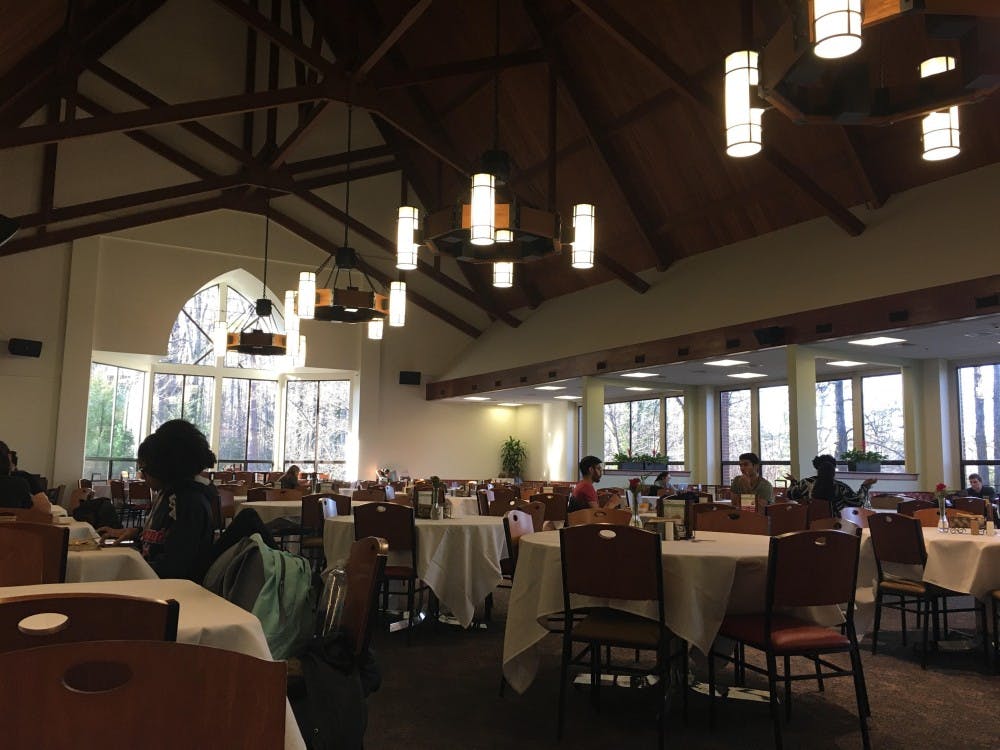Editor's note: After publication, it was brought to the attention of The Collegian that the views expressed by individuals belonging to student organizations in this article do not necessarily represent the views of the entire organization.
At the University of Richmond, some students feel that the social structure needs revision, they said.
In predominately white spaces, a hostile climate is common for students of color to experience on campuses in schools across the country, and this can have negative effects on academic success, according to the Washington Post.
Glyn Hughes, director of Common Ground, has noticed the lack of diverse interactions on campus.
“We have set it up so that the majority can go through four years here without having meaningful discussions about race,” Hughes said. The burden of creating inclusive spaces is on the shoulders of students of color who struggle with their sense of belonging on campus, he said.
Students of color feel excluded in many of the social events because they are so “white-dominated,” Jasmine Cousins, WC '19, said. The lack of diversity at many of the social events means that when students of color look around the room, it is difficult to find someone that resembles them.
“I don’t feel comfortable,” Cousins said. Being the only black girl in a room can be intimidating, she said, adding that the social scene is structured so that students spend time with the same groups of people and never branch out.
The lack of mixing between students and friend groups causes a racial and cultural disconnect on campus, Cousins said, leaving large segments of the student population close-minded or unaware of others' cultures.
Canvas Brieva, WC '19, does not perceive the social scene as being dominated by one group but rather as being segregated into multiple organizations. Brieva said students find a social group — whether it be a sports team or a student organization — and associate with that one group for all four years.
“Sororities and fraternities dominate the social scene,” Cousins said. Cousins has had difficulty fitting in because she feels that organizations on campus, in which she is not involved, control the culture.
“It is Greek-dominated,” Brooke Willemstyn, who is a member of Pi Beta Phi, said.
The lack of integration between races, cultures, student organizations or athletic teams causes a disconnect among the student body, Ismael Kagone, RC '17, said. Intergroup relations are rare and any sharing of culture, ideas or race is hard when there is little interaction among groups, he said.
Enjoy what you're reading?
Signup for our newsletter
“It’s easy to go four years and still not know people in my year,” Kagone said.
Kagone is the president of the Black Student Alliance (BSA) on campus and said that his role was amplified amid the feelings of exclusiveness. When there are many events happening on campus and none of them are for students of color, Kagone said he feels as though it is his responsibility to provide a space, such as a party.
“I’m not a huge proponent of parties,” Kagone said. “But I feel as if I have to make it happen, I have to help people have a space.”
BSA frequently hosts free events that provide students with a change in scenery from the fraternity lodge parties that happen most weekends. The BSA events are not hosted as frequently as lodges or Spider Nights, so when they happen, they are often heavily attended.
SpiderNights are led by cultural advisors (CAs). Brieva, a CA in Lakeview, said the group's goal was to promote wide intersections between the groups.
“Even if we can offer those crossing interactions, there’s a barrier to getting interest,” Brieva said.
Brieva also said they became a cultural advisor so that they could have a leadership role to bridge the gap between how campus currently is and what it should be.
“The alternatives that are offered do not equate to lodges,” Willemstyn said, because the options that are offered assume that student who do not want to go to Greek events do not want to party. “There aren’t any inclusive parties on campus,” Willemstyn said.
A solution to the lack of inclusive social scenes is that the campus community could play an active role in helping to foster connections among different people on campus, Hughes said.
“We can’t talk about the students of color or students who do not fit in thriving until we clarify the obligations of everybody to build an inclusive community,” Hughes said, adding that every student on Richmond's campus could make an intentional effort to make their peers feel comfortable.
An ideal social scene for Cousins would be one in which she did not feel the need to change who she is to fit in. For Cousins, the dining hall is where the separations between groups are most prevalent.
“The first room is full of Greeks, the second room, there’s sports and black groups and in the third room there’s everyone else,” she said.
What the social scene needs to be like is the third room of the dining hall, so that inclusivity can be promoted across groups and race, Cousins said.
“We need to break the idea that anyone needs to have interests or contacts to go to an event, a place for anyone to have a good time no matter their identity,” Brieva said.
Contact Social Media Manager Abby Muthoni at abigael.muthoni@richmond.edu. Follow Abby on Twitter at @abbyprime.
Support independent student media
You can make a tax-deductible donation by clicking the button below, which takes you to our secure PayPal account. The page is set up to receive contributions in whatever amount you designate. We look forward to using the money we raise to further our mission of providing honest and accurate information to students, faculty, staff, alumni and others in the general public.
Donate Now


